Key takeaways:
- Integrating security into the DevOps process (DevSecOps) is critical, fostering a culture of security awareness among team members enhances overall security posture.
- Security is a shared responsibility that builds trust with clients and allows for quicker response to incidents, reinforcing the importance of a vigilant mindset at all levels.
- Continuous training and collaboration between development and security teams are essential strategies for addressing vulnerabilities and cultivating a proactive security culture.
- Utilizing effective tools for vulnerability management and real-time monitoring can significantly improve security measures in a DevOps environment.
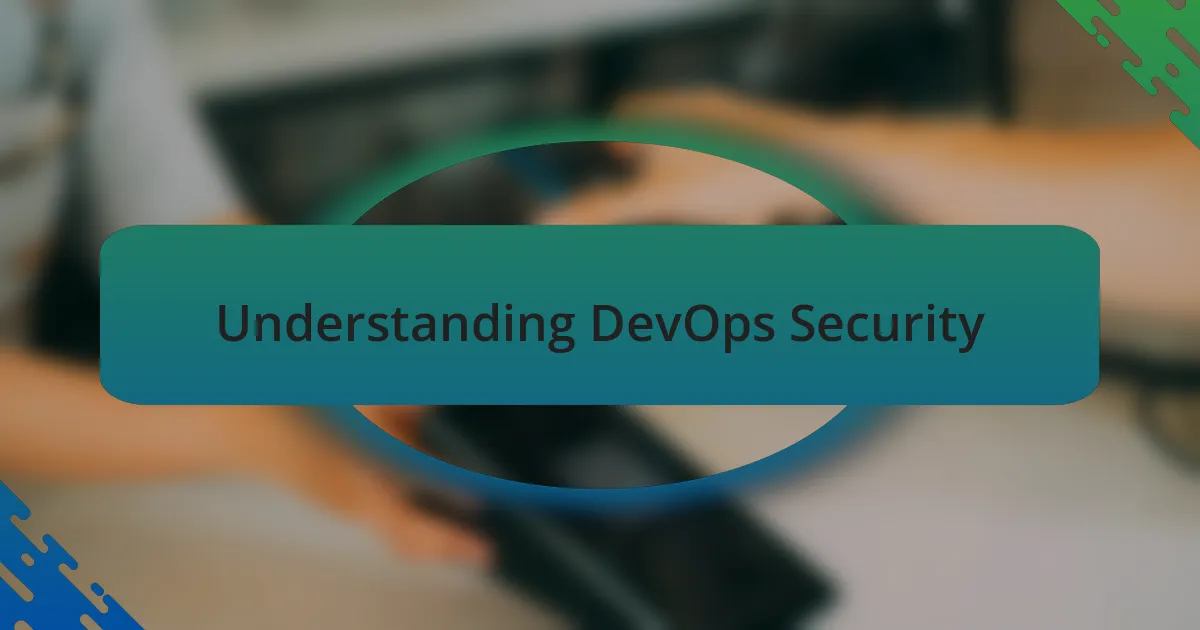
Understanding DevOps Security
DevOps security, often referred to as DevSecOps, emphasizes integrating security practices into the DevOps process from the start. I remember a time when our team faced a security breach that highlighted just how critical it is to bake security into our development pipeline. Rather than addressing security as an afterthought, we began embedding it into every phase, questioning how we could prevent future vulnerabilities.
As I delved deeper into this integration, I realized it’s not just about tools and technologies; it’s about fostering a culture of security awareness within the team. How often do we discuss security measures in our daily stand-ups or retrospectives? Personally, I’ve found incorporating these discussions has not only enhanced our security posture but has also led to a stronger sense of ownership among team members.
Understanding DevOps security also means recognizing that training and education are paramount. I vividly recall a workshop we organized where we simulated various attack scenarios. The insights gained from that session were invaluable, making it clear that when the whole team is educated about potential threats, we can collectively create a more secure environment. Isn’t it empowering to know that each member can contribute to a more robust security framework?
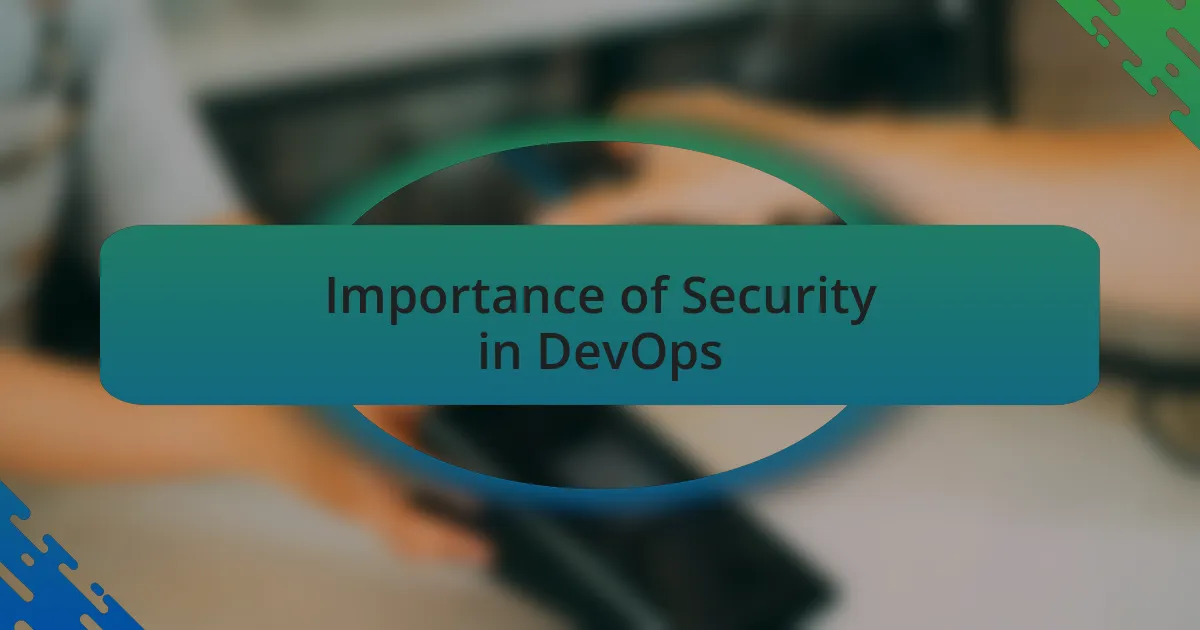
Importance of Security in DevOps
It’s essential to view security in DevOps as a shared responsibility rather than a burden. I recall a project where one of our developers noticed a minor vulnerability during a code review. Instead of brushing it off, we explored it together, discovering how interconnected our systems were. That moment reinforced the idea that a vigilant mindset at every level amplifies our overall security success.
Moreover, incorporating security into DevOps isn’t merely about compliance; it’s about trust. When I think back to conversations with clients, their biggest concern was always the safety of their data. By prioritizing security within our DevOps processes, I could confidently assure them that we were doing everything possible to protect their sensitive information. This not only built our credibility but also strengthened relationships with our customers.
Security in DevOps also allows for faster recovery from incidents. On one occasion, after a third-party service experienced a breach, we were able to respond swiftly because our security practices had already been integrated into our workflows. This proactive approach made a real difference in minimizing downtime. Reflecting on those experiences, I can say that when security is at the forefront, it enhances our agility, allowing us to innovate without compromising safety.
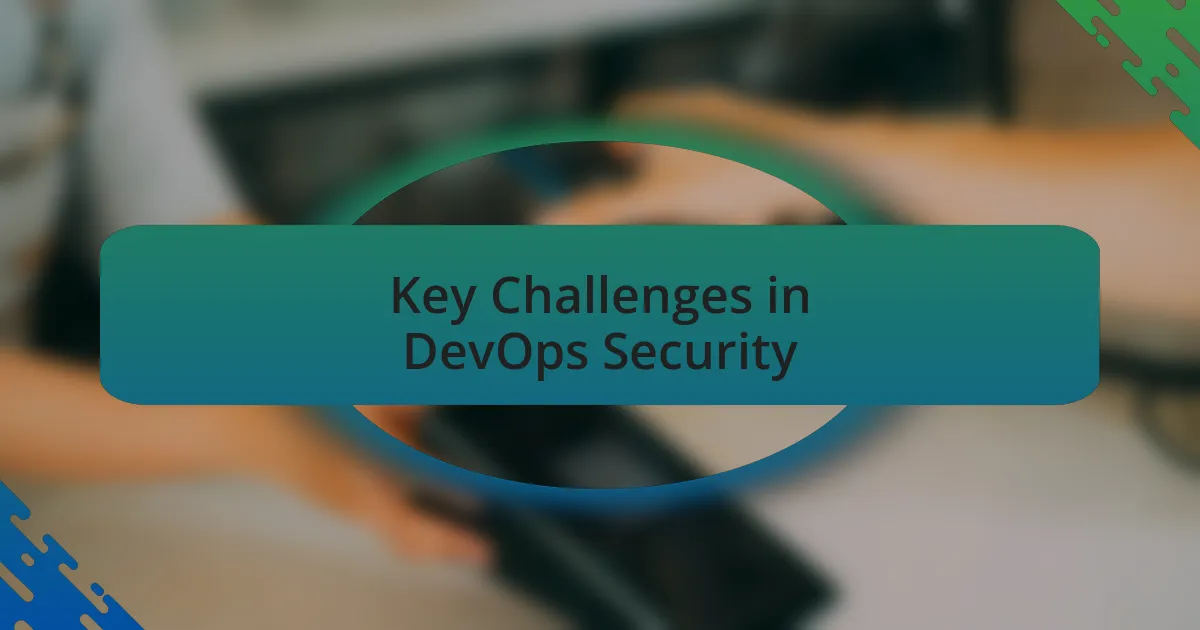
Key Challenges in DevOps Security
One key challenge in DevOps security lies in integrating security tools and processes seamlessly within existing workflows. I remember a time when my team struggled with various security tools that felt disparate and disconnected from our development environment. It made me wonder, how do we expect our developers to prioritize security when the systems in place create barriers instead of support?
Another significant hurdle is the lack of security awareness among team members. I vividly recall a colleague who unknowingly reused an old password across multiple platforms. It highlighted just how critical education is within the team. I often ask, how can we cultivate a culture of security awareness that goes beyond mere compliance? The answer lies in continuous training and open discussions about security concerns that empower everyone to take ownership.
Lastly, keeping up with evolving threats is an ongoing struggle in DevOps. During a particularly intense period, we faced a wave of phishing attempts that targeted our platform. It made me realize that even a minor lapse in vigilance could lead to dire consequences. What good is our agile process if we’re not agile in adapting our security measures? This constant evolution in threats demands that we remain alert and proactive, reinforcing the importance of a flexible security framework with room for growth and adaptation.
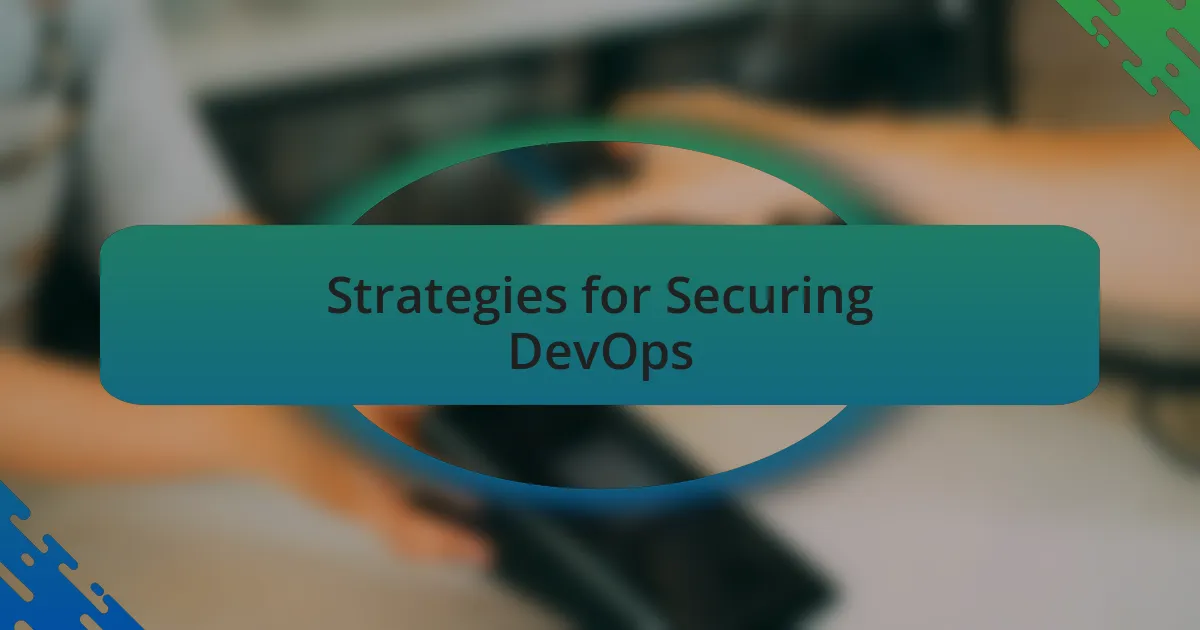
Strategies for Securing DevOps
To bolster security in a DevOps environment, I’ve found that incorporating automated security testing into the Continuous Integration/Continuous Deployment (CI/CD) pipeline is essential. In one memorable project, we implemented a tool that scanned our codebase for vulnerabilities every time a developer pushed new code. This proactive approach meant that security issues were caught early, preventing potential remediation headaches down the line. Doesn’t it feel much better to address security at the outset rather than scramble to fix issues later?
Another strategy I highly recommend is fostering a culture of collaboration between development and security teams, often referred to as DevSecOps. I recall a successful initiative where we set up regular joint meetings to discuss security implications related to our projects. This not only improved our overall security posture but also enhanced team relationships and encouraged shared responsibility. Have you ever considered how a simple shift in communication could enhance both security and team cohesion?
Finally, championing the principle of least privilege can safeguard your systems significantly. I once witnessed firsthand how giving users only the necessary access to perform their jobs prevented a potentially devastating data leak. It’s amazing how often we overlook the basics. Have you evaluated whether everyone in your team needs the level of access they currently hold? This strategy isn’t just about limiting access; it’s about reinforcing the trust and responsibility that comes with it.
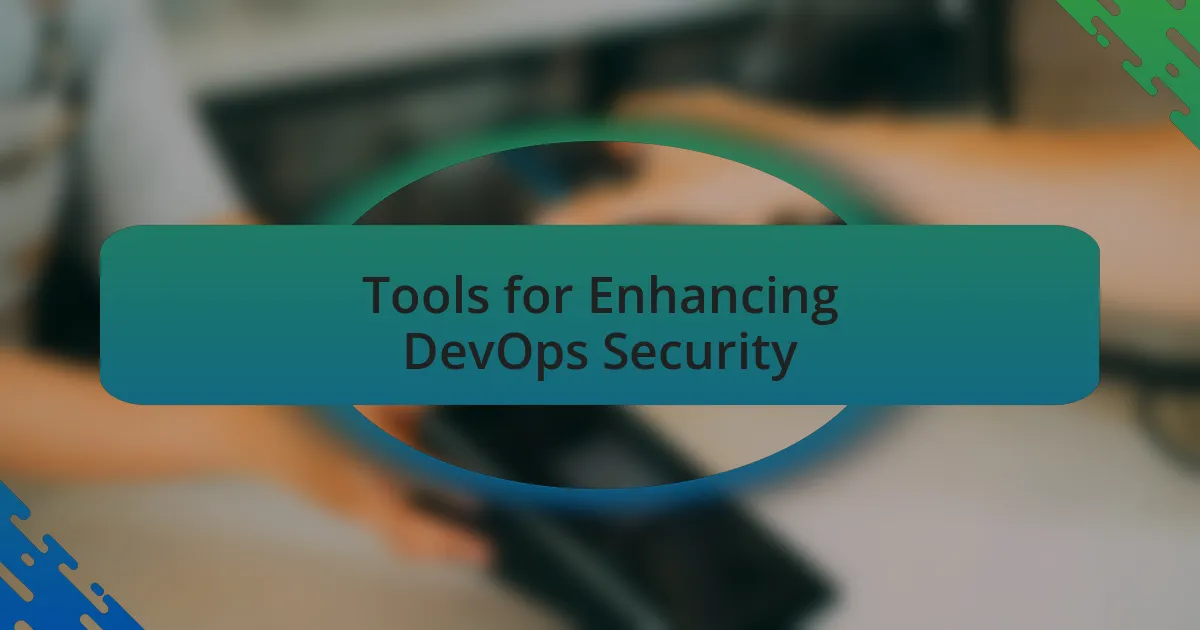
Tools for Enhancing DevOps Security
To enhance security in a DevOps environment, utilizing tools like Snyk or Aqua Security can be a game changer. When my team integrated Snyk into our CI/CD pipeline, I was impressed by its ability to not only identify vulnerabilities but also suggest fixes in real time. This feature simplified remediation and made it feel less daunting. Have you ever been overwhelmed by security reports? Tools like these can turn those daunting tasks into manageable actions.
Another invaluable resource is HashiCorp Vault, which manages secrets and sensitive data. I remember a project where we used Vault to securely store API keys and passwords. This eliminated the fear of exposure during deployment and instilled confidence in the team. It’s fascinating how better management of secrets can lead to a more secure environment. Have you explored how proper secret management can positively impact your workflows?
For continuous monitoring, I find that tools like Prometheus partnered with Grafana can help visualize potential security breaches effectively. I once worked on a project where setting up these tools allowed us to track unusual activity in real time. It was reassuring to have that visibility, which empowered us to respond swiftly. Have you thought about how real-time monitoring can enhance your security stance?
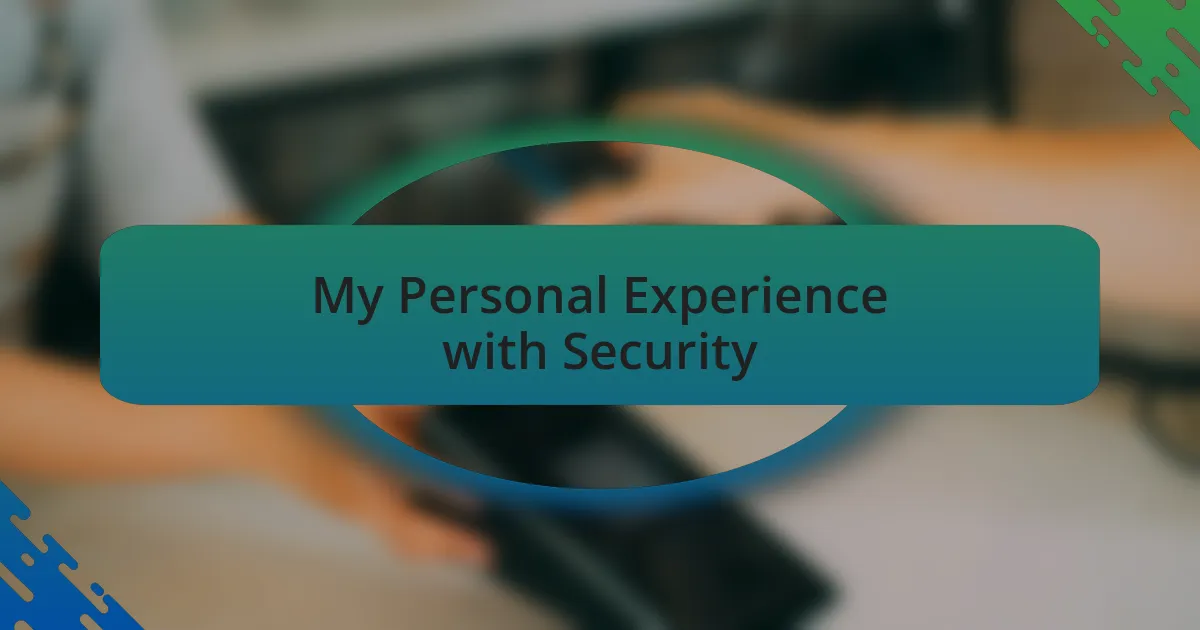
My Personal Experience with Security
When I first started integrating security into our DevOps practices, it felt like diving into deep water without knowing how to swim. I remember a project where we faced a major security incident due to misconfigured permissions. The panic was palpable, but it served as a wake-up call for me, highlighting the importance of embedding security from the very beginning. Have you ever experienced something similar that shifted your perspective on security?
I learned firsthand that training is crucial. In one instance, I organized a session for the team focused on the OWASP Top Ten vulnerabilities. Knowing that I could empower my colleagues to recognize and address these common threats made me feel more confident in our collective ability to tackle security issues. It’s interesting how sharing knowledge can create a culture of security awareness, don’t you think?
One of the most memorable moments was after we successfully conducted a security audit. The relief I felt when we discovered no critical vulnerabilities was incredible. It reassured me that our proactive measures were paying off, and it encouraged us to continue prioritizing security in our workflow. Have you ever experienced that exhilarating sense of achievement after overcoming a significant security hurdle?

Lessons Learned from My Journey
One key lesson I learned is the importance of collaboration across teams. In a recent project, I worked closely with developers, operations, and security professionals to identify potential threats early on. This cross-functional cooperation not only enhanced our security posture but also fostered a camaraderie that made tackling challenges feel less daunting. Have you ever found that team spirit helped you conquer a tough project?
Another insight came when I realized that security is not just a checkbox; it’s a mindset. After experiencing a close call with a data breach, I began to see security as an ongoing journey rather than a one-time effort. It was a transformative experience that reshaped how I approach my daily tasks. Don’t you think adopting a proactive mindset could change your perspective on how you handle security?
Finally, I learned that continuous improvement is essential. Implementing regular retrospective meetings allowed us to discuss security issues we encountered and brainstorm solutions together. It was empowering to see how addressing our mistakes led to better practices over time. How do you ensure that your team evolves and learns from past experiences?